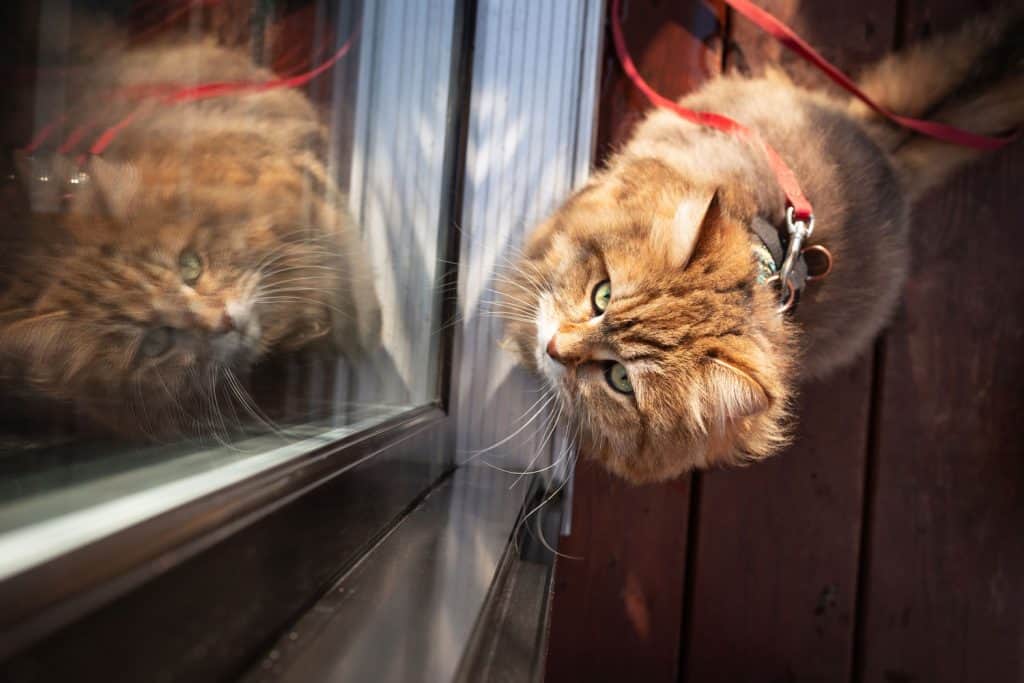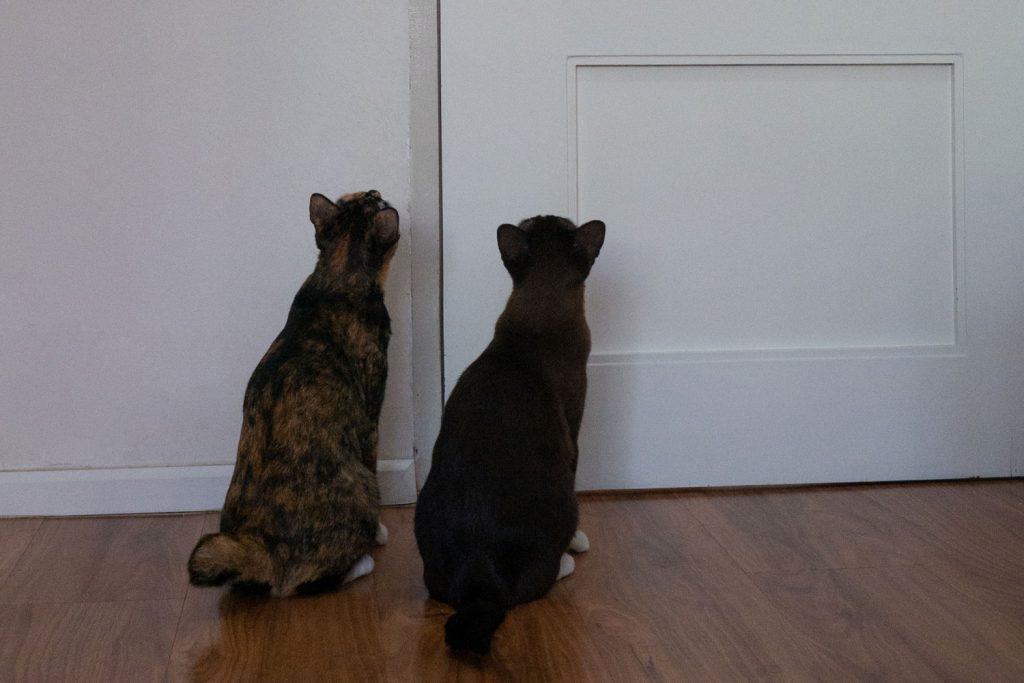No matter how sweet and amiable your fur babies are, as pet parents, you'll see a few things that they find hateful. Have they meowed endlessly when you closed your bedroom or bathroom door? If so, that instance might have left you wondering why cats seem to hate closed doors. Wonder no more. We've done the research so you'll better understand your furry friends' closed-door idiosyncrasy.
Cats hate closed doors because to them, they signify injustice. Since felines are territorial in nature, you do not just own them as pets. Yes, you take them to belong to your household. But to these furballs, belonging is not enough. It seems "co-ownership" is the name of the game. They feel like they also own your home.
Sounds weird. Isn't it? But that's how it is! Hang on, so you'll learn to empathize with your pet's behavioral quirk, set proper boundaries, and respect the "rights" of your home's "co-owner." You'll also get to discover how to stop your cats from meowing at your door and more about their attitudes and behavior towards your restricted rooms.

What Is It With Cats And Closed Doors?
The mystery behind cats hating closed doors can be attributed to their being territory bound. They have this sense of entitlement, making them believe they are actually the privileged owner of your house (and the cat parent included), so you don't have any right to undermine their power.
They might continuously meow, try to scratch, attack, and open a closed bathroom or bedroom door. It's because our feline friends see closed doors as a hindrance to their reign of the territory.
This territorial attitude is one of the wild instincts that they still possess. Felines remain largely unchanged despite the long years of domestication. Even with all the comfy bed, fancy toys, and canned meals, you can't expect them to always display prim and proper breeding.
Cats will be cats. The old feral characteristics and habits will at times show up.
Other Reasons Why Cats Hate Closed Doors
Aside from their territorial nature, the dislike for closed doors may be related to some other factors. Let's take a closer look at these rationales for your pet's closed-door peculiarity:
1. They're Desperate To Know What's On The Other Side
Coming from their strong survival instinct, which they inherited from their wild ancestors, cats are naturally curious. They may be considered domesticated species but the hunting reflex still runs in their blood. This tendency explains why they explore in every corner, with all the freedom they are supposed to enjoy.
Although your feline pet is in the comfort of your home, they don't necessarily feel restricted. They will try to find a new territory and possible hunting grounds, trying to open your door while being eager to see what‘s on the other side. They will do everything it takes just to satisfy their curiosity!
2. They Think You're A Part Of Their Colony
In spite of our feline pets' solitary temperament as hunters, some of them have been known to live as a colony. That's why cats can also exhibit such an "interpersonal" nature where they long for companionship and sharing of resources and being on the lookout for other members of the cat community.
According to a cat behavior expert, there's no evidence that cats see fur parents as a separate category when it comes to socialization. They recognize that you're bigger than them, yet unlike dogs, they don't see you as separate species.
Thus, your furry friends will treat you like their colony companions. Keeping their tails up, rubbing around your legs, staying beside you, licking, and grooming you are obviously what they do to other cats.
The problem with a closed door is that it won't give them an idea of what you're doing, which sounds divisive. As a co-team member, they will wonder what you're up to. Or maybe they're in suspicion that you're selfishly savoring all the good treats!
3. They’re In The Mood To Socialize
Cats are often described to be less friendly or completely aloof, but fur parents know that it's always not the case. They may have been characterized as solitary hunters, but they can be amazingly adaptable. They show how they long for their beloved human friend by being nosy and clingy at times.
Felines aren't as sociable as dogs or humans, but most of them are able to socialize. Closed doors, on the other hand, are anti-social and make them feel left out.
Are Cats Scared Of Closed Doors?

Not that they're scared of closed doors. Watch the Impatient Cat video below, and listen to what Shorty's meows may be saying. Could they sound like these lines? "Lemme in... Don't ever close the door on my face!"
As we've discussed above, cats are that curious to care about what's happening behind closed doors, they couldn't stand it to wait. A few minutes of waiting would be like days or forever to these eager furry friends.
Zee and Zooey's Cat Chronicles captures it well into these verbal feline complaints:
Where are you?!! Why is this door closed?!! Let us in!!!! The injustice of it all!
How Do I Get My Cat To Stop Meowing At The Door?
Your cat meowing at the door could be a hassle, especially when they do it all night. Here are some strategies to try and stop that night-meowing distraction that might keep everyone in the house awake:
1. Reset Your Cat's Body Clock
It's normal for cats to sleep for around 12-20 hours in the daytime, making them active at night. As crepuscular animals, their peak activity is usually at dusk and dawn.
Kittens and younger cats tend to be even more energetic at night because of their instinct for hunting time. Your furry pets on the prowl at midnight or before sunrise can be undeniably frustrating.
The good news is you can divert their attention so they will be resting instead of meowing at your door. Here's how you can employ practical ways to fix their sleep schedules at night:
- Avoid your cat having too many naps in the morning or afternoon that will reduce their night sleeping time.
- The secret is to keep them awake and busy during the day. Using a puzzle cat feeder is an effective trick to increase mental and physical exertion during their meals.
- Despite being busy with many things, it's ideal to have playtime with your kitty. Like other pets, your fur kid needs attention and entertainment. Without a fun interaction, they may feel lonesome, uneasy, and bored at night, which could lead to a disturbing meows at the door while you're asleep.
- A little hunting and playing with cat toys could tire your furball and cause them to have peaceful sleep through the night.
2. Feed Them Enough Food And Water
Having a particular feeding schedule is also convenient. This would train them to eat based on their cat parent's meal plan and time frame. It's apparently a way of telling your cats that they can't eat just anytime they want to.
It's ideal to feed your furball before bed, making sure that they're full enough for the whole night. You should also fill their water bowl in case they get thirsty. By doing so, they will not meow for food and water during your sleeping hours.
3. Keep Their Litter Box Clean Before Bed
Cats are fussy when it comes to bathroom comfort. A dirty litter box could keep them awake and crying at night. Scooping before bed allows your pet to have a clean environment.
The box should also be washed and emptied when needed. A clean and glistening litter box would keep them quiet and relaxed at night.
4. Set Up Night Lights For Senior Cats
A cat's night-time vision and cognitive functions may deteriorate as they get older, making them vulnerable and anxious to roam around your home. Those emotions are a common reason for their shrill howling and meowing at night.
To solve this problem, place night lights around the corners of your house, specifically near the stairs that could be a potential hazard area. This step would make them more confident and avoid that night-meowing disturbance at your closed bedroom door.
5. Don't Make A Brat Out Of Your Cat
It's important to meet their needs but if your cat wails just to grab your attention, ignore them. The meowing can be their way of whining to get what they want. Let them know that this attitude won't get you out of bed.
This tactic would be a struggle at first, but once your kitty becomes trained and disciplined, the weeks of waiting will be worth it.
Watch this video that visually sums up how to succeed at getting your cat to stop meowing at night:
Should I Close My Door At Night With A Cat?
A fur parent with 20 years of experience with felines says that closing the door at night with your cat is not necessary. You might as well keep the door open for a much wanted undisturbed sleep for you and your fur baby.
If you're a private person, though, and would rather close your bedroom door at night, meet your furry pet halfway by installing a cat door. Choose an easy-to-install no-flap door that's purrfect and safe for them to come in and out when they like, without disturbing anyone.
Click here to see this Purrfect Portal interior no-flap cat door on Amazon.
What Does It Mean When A Cat Lays By The Door?
A cat laying by the door conveys that they want to get your attention. The doorway is not just where the action is. It provides them a good range of visibility where they're able to get a glimpse of two rooms. It's also a strategic place that doubles their escape route in case they'll need one.
In Closing

Inasmuch as closed doors may allude to something as negative as rejection and imprisonment in psychology and dramatic movies, our smart feline pets may imbibe the same meaning. To them, closed doors aren't fair. They're a threat to their territorial reign and freedom to explore.
Cats hate it that closed doors are taking away from them their knack for ownership and community living. So the next time you demand privacy by closing your interior doors, think again and place yourself in your cat's shoes.
Oops! Before you freak out, check out these articles about cat beds:
Do Calming Anti-Anxiety Cat Beds Work?
Should Each Cat Have Their Own Bed?
Some elements on this page may have been created by our team using advanced AI to provide you with top-notch cat inspired ideas. Read more about our AI Content Policy.


Thanks for the inspiration! For the sake of my two cats, I’ve just placed an order for the supplies needed to prepare a batch of these treats.
In addition, the aesthetics of the presentation are first-rate. From the jar lids to the nibbles, everything is done to perfection. What a great post, I’m pleased I found it today!